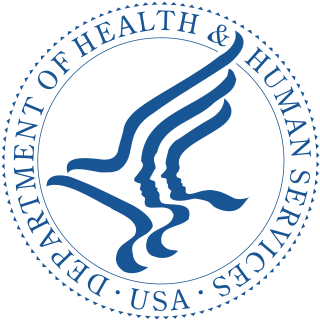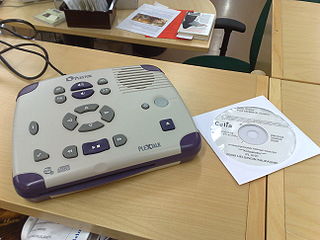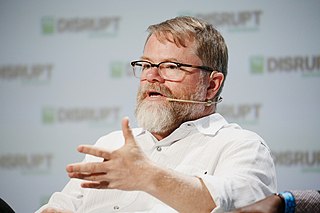
The United States Department of Health and Human Services (HHS) is a cabinet-level executive branch department of the U.S. federal government created to protect the health of the U.S. people and providing essential human services. Its motto is "Improving the health, safety, and well-being of America". Before the separate federal Department of Education was created in 1979, it was called the Department of Health, Education, and Welfare (HEW).

Accessibility is the design of products, devices, services, vehicles, or environments so as to be usable by people with disabilities. The concept of accessible design and practice of accessible development ensures both "direct access" and "indirect access" meaning compatibility with a person's assistive technology.
Service and supports for people with disabilities are those government or other institutional services and supports specifically provided to enable people who have disabilities to participate in society and community life. Some such services and supports are mandated or required by law, some are assisted by technologies that have made it easier to provide the service or support while others are commercially available not only to persons with disabilities, but to everyone who might make use of them.

Digital accessible information system (DAISY) is a technical standard for digital audiobooks, periodicals, and computerized text. DAISY is designed to be a complete audio substitute for print material and is specifically designed for use by people with "print disabilities", including blindness, impaired vision, and dyslexia. Based on the MP3 and XML formats, the DAISY format has advanced features in addition to those of a traditional audio book. Users can search, place bookmarks, precisely navigate line by line, and regulate the speaking speed without distortion. DAISY also provides aurally accessible tables, references, and additional information. As a result, DAISY allows visually impaired listeners to navigate something as complex as an encyclopedia or textbook, otherwise impossible using conventional audio recordings.

Inclusion, in relation to persons with disabilities, is defined as including individuals with disabilities in everyday activities and ensuring they have access to resources and opportunities in ways that are similar to their non-disabled peers. Disability rights advocates define true inclusion as results-oriented, rather than focused merely on encouragement. To this end, communities, businesses, and other groups and organizations are considered inclusive if people with disabilities do not face barriers to participation and have equal access to opportunities and resources.
The Catalan Association for the Blind and Visually Impaired, with headquarters in Barcelona, is a non-profit organization, registered in the Registre d'Associacions de la Conselleria de Justícia de la Generalitat de Catalunya with the number 14,965 and declared of Public Utility by the Ministerio del Interior on December 29, 1997.
Virtual volunteering refers to volunteer activities completed, in whole or in part, using the Internet and a home, school buildings, telecenter, or work computer or other Internet-connected device, such as a smartphone or a tablet. Virtual volunteering is also known as online volunteering, remote volunteering or e-volunteering. Contributing to free and open source software projects or editing Wikipedia are examples of virtual volunteering.

Patrick Ball is a scientist who has spent more than thirty years conducting quantitative analysis for truth commissions, non-governmental organizations, international criminal tribunals, and United Nations missions in El Salvador, Ethiopia, Guatemala, Haiti, South Africa, Chad, Sri Lanka, East Timor, Sierra Leone, South Africa, Kosovo, Liberia, Peru, Colombia, the Democratic Republic of Congo, and Syria. As director of research at Human Rights Data Analysis Group, he assists human rights defenders by conducting rigorous scientific and statistical analysis of large-scale human rights abuses. He received his bachelor of arts degree from Columbia University, and his doctorate from the University of Michigan.
Bookshare is an online library of accessible ebooks for people with print disabilities, such as visual impairment, severe dyslexia, and cerebral palsy. An initiative of Benetech, a social enterprise organization based in Palo Alto, California, it was founded in 2001 by Jim Fruchterman. Bookshare provides books in DAISY, EPUB, BRF, MP3, and Microsoft Word document formats. Books have been contributed by volunteers, authors, libraries, universities, and publishers. By 2010 more than half of books had been contributed by publishers and by 2020 more than 900 publishers had partnered with Bookshare, contributing to its library of more than 900,000 books.

Jim Fruchterman is an engineer and social entrepreneur. He was the founder and longtime CEO of Benetech, a Silicon Valley nonprofit technology company that develops software applications to address unmet needs of users in the social sector. He is the recipient of numerous awards, including the MacArthur Fellowship and the Skoll Award for Social Entrepreneurship.
Design for All in the context of information and communications technology (ICT) is the conscious and systematic effort to proactively apply principles, methods and tools to promote universal design in computer-related technologies, including Internet-based technologies, thus avoiding the need for a posteriori adaptations, or specialised design.
Council for Canadians with Disabilities (CCD), formerly known as the Coalition of Provincial Organizations of the Handicapped (COPOH), was created by people with disabilities in 1976 to provide support for all people with disabilities who seek the opportunity to go to school, work, volunteer, have a family, and participate in recreational, sport and cultural activities. The CCD is a national human rights organization of people with disabilities working for an accessible and inclusive Canada. In the 1970s, the CCD became a permanent part of the disability rights movement and it became a fluid entity that includes people with a range of different disabilities. To manage the work that will lead to the achievement of this goal, CCD established the following Committees to guide their activities in key areas:
- Human Rights Committee: Identifies Human Rights Committee issues of concern to persons with disabilities that could be addressed through law reform initiatives.
- Social Policy Committee: Identifies Social Policy Committee issues of national concern to persons with disabilities.
- Transportation Committee
- International Development Committee: Provides advice to CCD National Council on reforms that would improve the effect of Canada's foreign aid and policy on persons with disabilities.
- Access to Technology Committee.

The California Department of Rehabilitation (DOR) is a California state department which administers vocational rehabilitation services. It provides vocational rehabilitation services and advocacy from over 100 locations throughout California seeking employment, independence, and equality for individuals with disabilities. The DOR was established on October 1, 1963.
In July 2005, in an abandoned warehouse in downtown Guatemala City, Guatemala, delegates from the country's Institution of the Procurator for Human Rights uncovered, by sheer chance, a vast archive detailing the history of the defunct National Police and its role in the Guatemalan Civil War. Over five rooms full of files containing names, address, identity documents, were brought to light.

Graeme Gordon Innes AM is a lawyer, mediator and company director, university chancellor and was Australia's Disability Discrimination Commissioner from December 2005 to July 2014.

The Disability Rights Education and Defense Fund (DREDF), located in Berkeley, California, and Washington, DC, US, is a national cross-disability civil rights law and policy center directed by individuals with disabilities and parents who have children with disabilities. Founded in 1979, DREDF advances the civil and human rights of people with disabilities through legal advocacy, training, education, and public policy and legislative development. The Berkeley office is located in the Ed Roberts Campus.
Accessibility apps are mobile apps that increase the accessibility of a device for individuals with disabilities. Accessibility apps are applications that increase the accessibility of a device or technology for individuals with disabilities. Applications, also known as, application software, are programs that are designed for end users to be able to perform specific tasks. There are many different types of apps, some examples include, word processors, web browsers, media players, console games, photo editors, accounting applications and flight simulators. Accessibility in general refers to making the design of products and environment more accommodating to those with disabilities. Accessibility apps can also include making a current version of software or hardware more accessible by adding features. Accessibility apps main aim is to remove any barriers to technological goods and services, making the app available to any group of society to use. A basic example is that a person who experiences vision impairments is able to access technology through enabling voice recognition and text-to-speech software. Accessibility apps are closely related to assistive technology.

Jyothirgamaya Foundation is a nonprofit organization, based in Thiruvananthapuram Kerala which is actively involved in the empowerment of persons with visual impairment founded in 2015 by Tiffany Brar. The project started as a mobile blind school in 2012. Tiffany Brar herself, traveled through rural areas in public transport in search of blind people of all ages in rural areas in India, with the aim of bringing out of the four walls of their house, to which they are confined, and brings a new light to their eyes, which has nothing to do with their eyesight. Jyothirgamaya Foundation holds Special consultative status with United Nations.
BeeLine Reader is a software system which adds color gradients to digital text to improve reading ability and focus. The text at the end of each line is colored the same as the beginning of the next, so the color of the text acts as a flag post that directs the reader's eyes through the text more easily. In each line, the color of the text transitions from one color to another, with each character being slightly different than the preceding and following characters.










